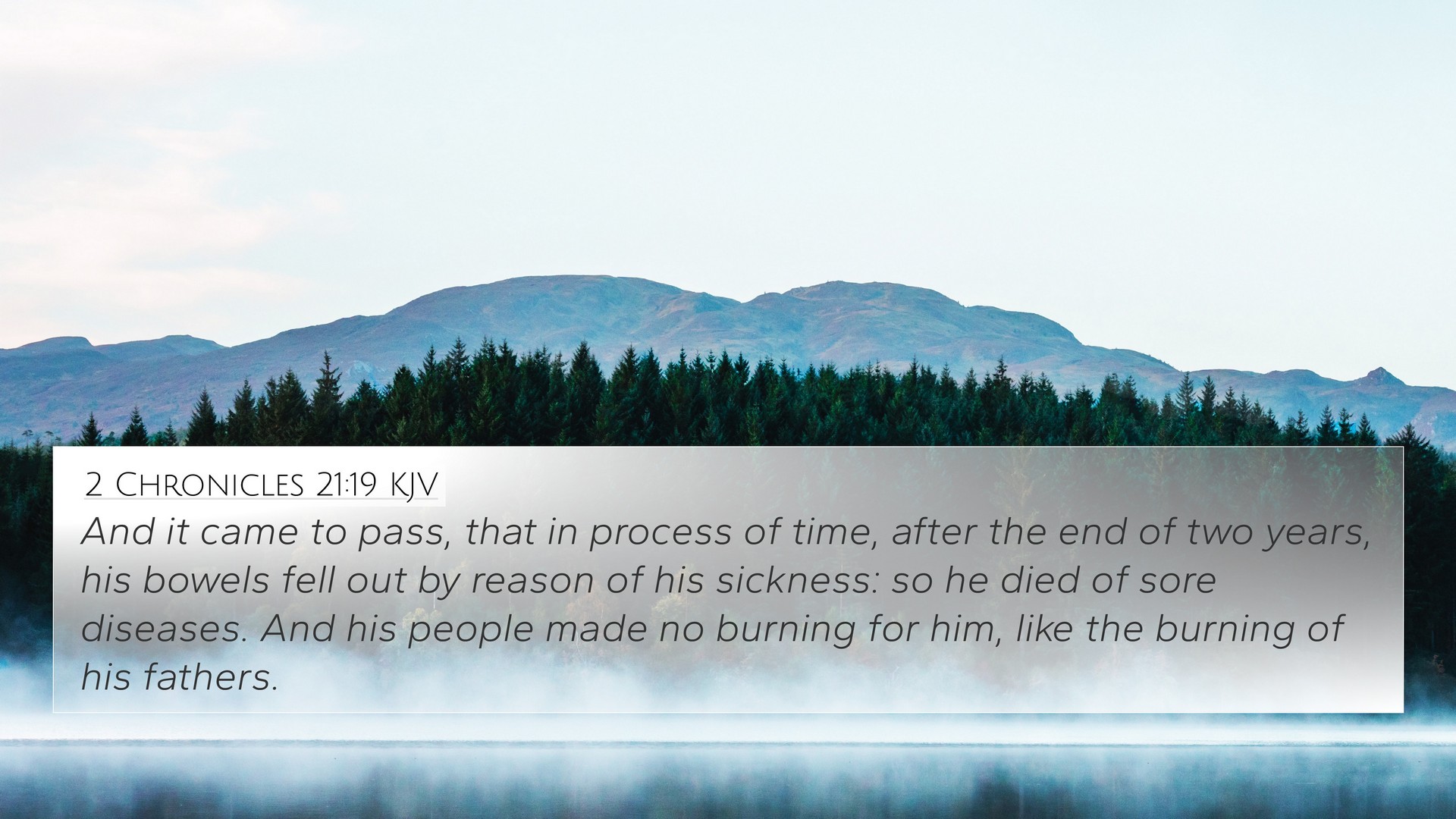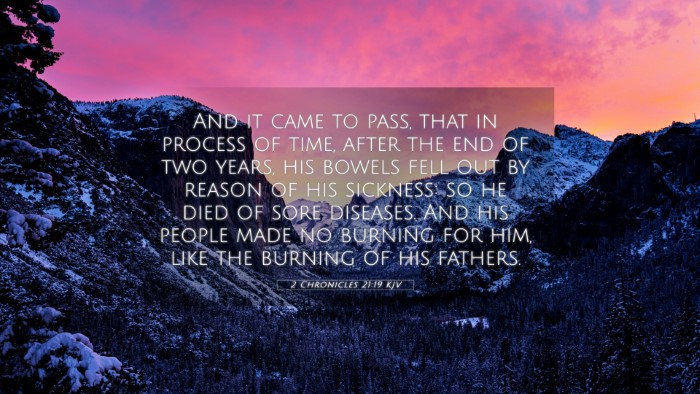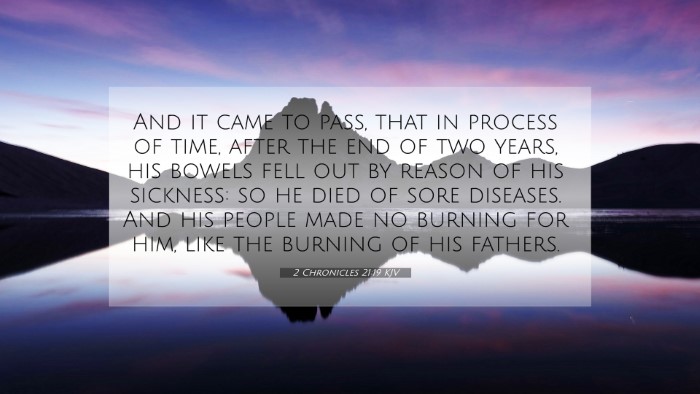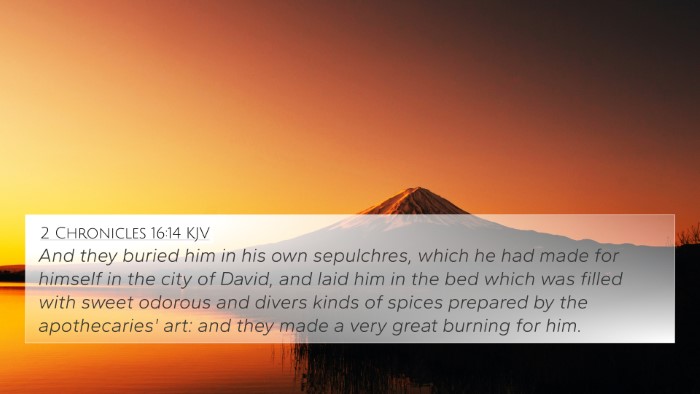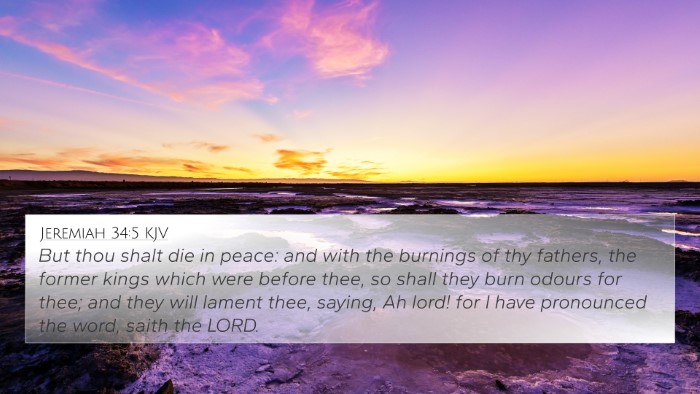Understanding 2 Chronicles 21:19
Bible Verse: 2 Chronicles 21:19 - "And it came to pass, that in the course of time, after the end of the second year, his bowels fell out by reason of his sickness: so he died of sore diseases. And his people made no fire in his honor, like the fire of his fathers."
Summary of Meaning
The verse 2 Chronicles 21:19 provides a sobering account of the death of King Jehoram of Judah, illustrating the consequences of his actions and the inevitable culmination of his disregard for God. As noted by various commentators, this verse encapsulates themes of divine judgment and the societal response to a king’s failure.
Commentary Insights
Matthew Henry's Commentary
Matthew Henry reflects on the tragic end of Jehoram, emphasizing that it was a consequence of his sinful lifestyle. Jehoram is noted to have turned away from the Lord and led the people of Judah into idolatry. Henry highlights that this verse not only records Jehoram's physical suffering but also signifies how his subjects viewed him, as they did not honor him in death, a stark contrast to how they honored his ancestors.
Albert Barnes' Notes
Albert Barnes points out the historical significance and the gravity of Jehoram's situation. He suggests that the intensity of his illness symbolized divine retribution for his actions. Furthermore, Barnes elaborates that the lack of a funeral fire reflects the judgment of God against Jehoram, indicative of the people's feelings toward their king's unfaithfulness to God and to the traditions of Judah.
Adam Clarke's Commentary
Adam Clarke provides a detailed description of the physical ailments that befell Jehoram. He discusses the nature of the diseases as a physical manifestation of divine punishment due to Jehoram's many transgressions, including the murder of his brothers and leading his people astray. Clarke also notes the significance of the absence of fire in honor, which was customarily an expression of respect for a deceased king, reflecting the general disdain for Jehoram.
Thematic Connections
This verse can be understood better through a lens of various interrelated biblical themes. Below are several cross-references that provide depth to its meaning:
- 2 Kings 8:24-25 - This passage provides additional context to Jehoram's reign and his moral failings.
- 2 Chronicles 21:12-15 - These verses foreground the prophetic warning issued to Jehoram about his sinful practices.
- Hebrews 12:6 - This New Testament verse speaks to the nature of divine discipline, aligning with the suffering Jehoram experienced.
- Proverbs 28:5 - Reflects the contrast between the righteous and the wicked, applicable to Jehoram’s leadership style.
- Ezekiel 18:30 - Calls for repentance, showcasing how Jehoram failed to heed such calls throughout his life.
- Deuteronomy 21:18-21 - Discusses the consequences of rebellious sons, relevant to Jehoram's destructive actions.
- 1 Kings 21:20-23 - Another narrative of divine judgment that resonates with Jehoram's story of disobedience.
Cross-Referencing Biblical Texts
When conducting a study on Jehoram's demise in 2 Chronicles 21:19, it is beneficial to utilize tools for Bible cross-referencing to uncover deeper thematic connections and implications. Below are some methods and resources that can aid in this study:
- Bible Concordance: Useful for tracking themes and words across scripture.
- Bible Cross-Reference Guide: Helps identify similar verses and connections between texts.
- Cross-Reference Bible Study: A methodical approach to explore relationships between different scriptural passages.
- Bible Chain References: Enables readers to follow thematic threads through various books.
- Comprehensive Bible Cross-Reference Materials: These tools assist in generating insights from complex scriptures.
Conclusion
2 Chronicles 21:19 serves as a powerful reminder of the consequences of turning away from God's commandments. By exploring related scriptures and utilizing cross-referencing tools, one can gain a deeper understanding of its implications and thematic connections within the larger biblical narrative.
